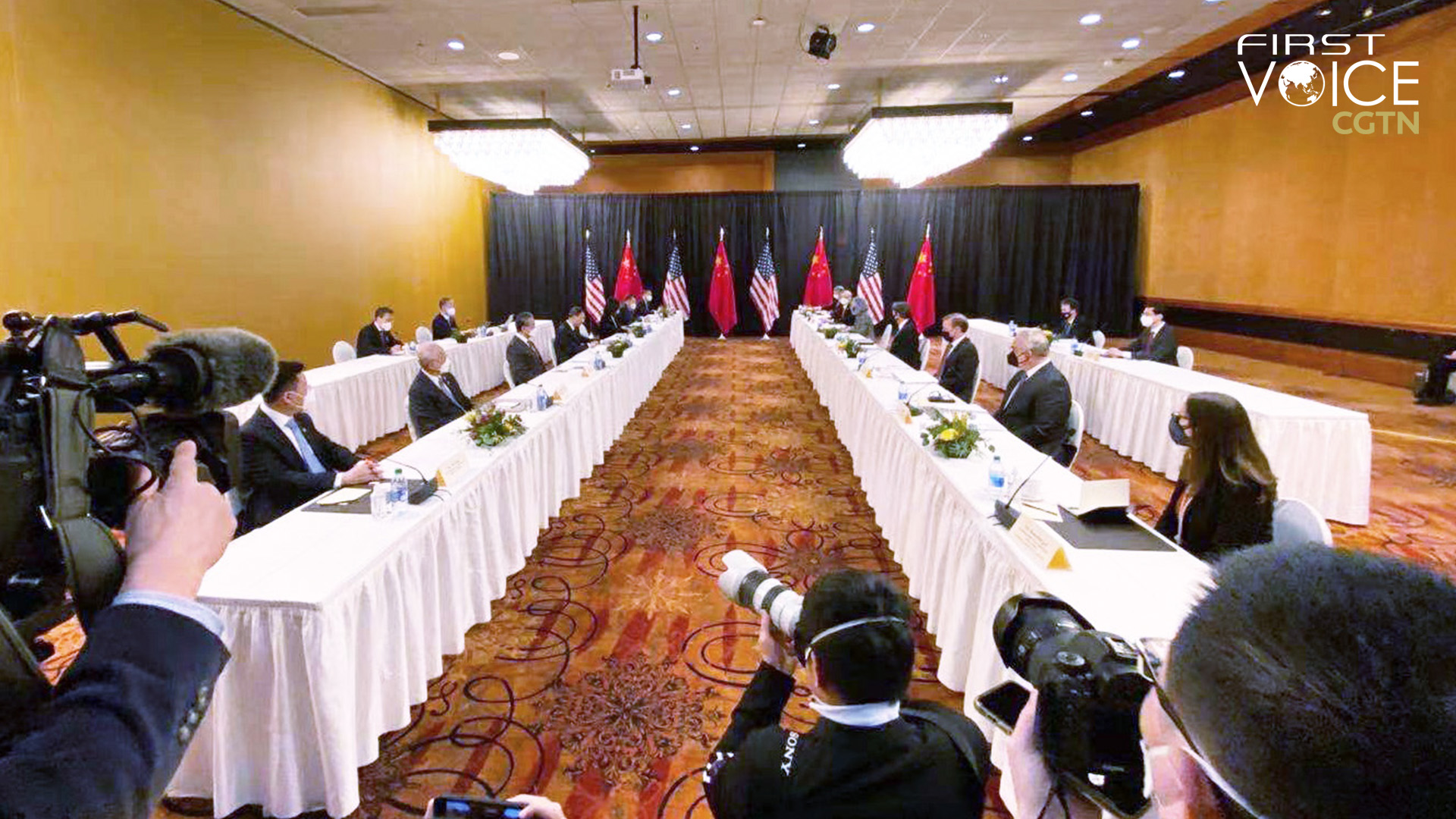
Editor's note: CGTN's First Voice provides instant commentary on breaking stories. The daily column clarifies emerging issues and better defines the news agenda, offering a Chinese perspective on the latest global events.
Following a public press conference where both sides exchanged tough views, China and the U.S. completed their first strategic dialogue under the Biden administration in Anchorage, Alaska.
When the Chinese delegation arrived in Alaska, their hearts were chilled by the biting cold, but even more by the reception from their American hosts. Blinken and his State Department may felt quite proud of their efforts to isolate and embarrass China ahead of the meeting in Anchorage. But after facing insult after insult, the Chinese delegation stood up and said "No!" to Western condescension and bullying.
The U.S. had better get used to it.
New York Times columnist Ross Douthat says America suffers from "economic stagnation, institutional decay and cultural and intellectual exhaustion at a high level of material prosperity and technological development."
In the U.S., COVID-19 has left half a million dead so far, the aftermath of government impotence and incompetence. Half the country, egged on by corrupt elites and corporate interests, don't believe climate change is a real threat to humanity. And the government is too weak to stand up to industry and make the changes necessary to cut carbon emissions.
The U.S. brags about its democracy, even though its policy is most frequently dictated by the bureaucrats and the bureaucratic system. Congress struggles with basic tasks such as keeping the government funded and running. The U.S. is in a new gilded age, where selling digital kittens for millions of dollars is mistaken for innovation. Its politics are stalemated, its institutions are brittle, and its wealth is funneled to a small circle of elites.

A patient is wheeled out of Elmhurst Hospital Center to a waiting ambulance in New York, U.S., April 7, 2020. /AP
A patient is wheeled out of Elmhurst Hospital Center to a waiting ambulance in New York, U.S., April 7, 2020. /AP
The dialogue proceeded to become realistic and pragmatic. China's top diplomat Yang Jiechi characterized the talks between the two powers as candid, constructive and beneficial, but noted nonetheless "there are still differences." U.S. Secretary of State Anthony Blinken stated that the two sides "were also able to have a very candid conversation over these many hours on an expansive agenda," including on Iran, the DPRK, Afghanistan and climate change.
It represents the first step forward in restoring stability to a bilateral relationship that the previous administration approached with a sledgehammer. It represents a fundamental recognition that despite differences, China and the United States share a set of overlapping interests and a shared preference for global stability. The two countries are fundamentally better off working with one-another and establishing common ground than treating each other as enemies.
The previous administration in Washington sought to rewrite the China-U.S. relationship and its relevance to the rest of the world on fundamentally unilateral terms and on a simple equation of win or lose. Mike Pompeo sought to engage in historical revisionism and dismiss the entirety of modern relations between the two countries. That naivety came at America's expense. This misleading trope ignored the more nuanced reality that the China-U.S. relationship, even if productive, always had its differences. It has always been multifaceted whereby despite both sides having differing strategic and ideological visions, the focus has nonetheless embedded on common interests.

The Captain Cook hotel, which hosts the Chinese and U.S. delegations and their strategic dialogue, in Anchorage, Alaska, U.S. /VCG
The Captain Cook hotel, which hosts the Chinese and U.S. delegations and their strategic dialogue, in Anchorage, Alaska, U.S. /VCG
China and America are currently two of the world's most powerful countries and largest economies. They are both anchors of global affairs. Both countries have a stake and responsibility to oversee the most prominent global issues of the time. Engagement and dialogue are not weakness. They are signs of how mature, rational and responsible people do foreign policy. It is absolutely wrong and damning even to present global affairs as a simple, binary game of competition, power and self-benefit. The world has suffered deeply from that mindset in generations long gone.
China and the U.S. each will continue to advocate what they depict as their "core interests," but this must be met with a sense of underlying restraint. How can one engage in cooperation for example, if America is obsessed with interfering in China's national sovereignty and territorial integrity? Sure the U.S. has its "principles" - but this must be done in a fair, pragmatic and reconciliatory way as opposed to, for example, whipping up unrest in Hong Kong, clinging onto the "genocide" rhetoric on Xinjiang, or promoting tensions in the Taiwan Straits. How China conducts its internal policies is its business, nobody else's.
China doesn't seek hegemony. It has no interest in seeking to become the world's police. It wants to protect and improve the current system alongside other countries so that each country could propose from the relationship they share with each other. All successful relationships are built on give and take. China and U.S.' are too. And as the introduction of the meeting shown a mere laundry list of demands is not productive. There must be an attempt to understand and engage with China.
The rebuilding of the China-U.S. relationship cannot end with this. This one dialogue is not an end in and of itself. It is a pathway, a process and hopefully a route to better things. Yet it nonetheless marks the first breathing space for the China-U.S. relationship that has been suffocating for years. Complexities must be appreciated and stable engagement must return. Cooperative agenda between the two countries must be expanded – for the sake of the two countries and the world.
(If you want to contribute and have specific expertise, please contact us at opinions@cgtn.com.)

